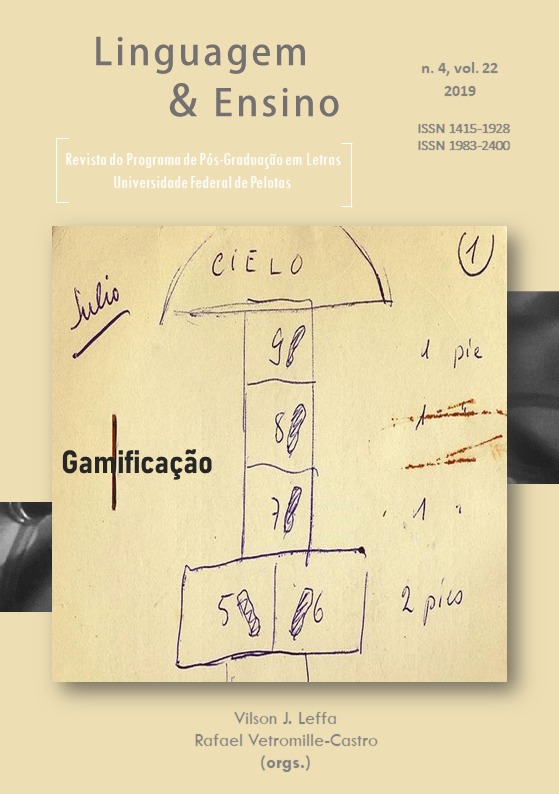Letramentos acadêmicos e gamificação: pontos “fortes” e “fracos” no processo de textualização verbo-visual
Palavras-chave:
Letramentos acadêmicos, Gamificação, Discurso
Resumo
Este artigo analisa posicionamentos discursivos em produções verbo-visuais de uma Árvore de habilidades (mecânica do jogo digital on-line League of Legends ) baseada numa atividade gamificada. Posicionamentos discursivos são entendidos como posição enunciativa que caracteriza uma identidade social e ideológica em certo campo discursivo (MAINGUENEAU, 2004). Baseamo-nos em pressupostos teórico-metodológicos dos Estudos de Letramentos (New Literacy Studies) e da Análise do Discurso de linha francesa, no que se refere a práticas sociais de leitura e escrita em contexto acadêmico. A análise qualitativo-interpretativa concentra-se em observar pontos “fortes” e “fracos” reconhecidos pelos próprios sujeitos na atividade. O artigo busca contribuir com estudos de letramentos acadêmicos, apresentando princípios de gamificação como dispositivos e recursos didáticos que podem ser observados em diferentes contextos institucionais (acadêmico e profissional, por exemplo). Além disso, essa proposta ainda tem a vantagem de ser feita ou não com uso de tecnologias digitais.Downloads
Não há dados estatísticos.
Publicado
2019-12-23
Como Citar
Guimarães Alexandre, G., & Cristina Komesu, F. (2019). Letramentos acadêmicos e gamificação: pontos “fortes” e “fracos” no processo de textualização verbo-visual. Revista Linguagem & Ensino, 22(4), 1199-1220. https://doi.org/10.15210/rle.v22i4.16456
Seção
Artigos
Autores que publicam nesta revista concordam com os seguintes termos: Autores mantêm os direitos autorais e concedem à revista o direito de primeira publicação, com o trabalho simultaneamente licenciado sob a Licença Creative Commons Attribution (BY-NC-ND 2.5 BR) que permite o compartilhamento do trabalho com reconhecimento da autoria e publicação inicial nesta revista. Autores têm autorização para assumir contratos adicionais separadamente, para distribuição não-exclusiva da versão do trabalho publicada nesta revista (ex.: publicar em repositório institucional ou como capítulo de livro), com reconhecimento de autoria e publicação inicial nesta revista. Autores têm permissão e são estimulados a publicar e distribuir seu trabalho online (ex.: em repositórios institucionais ou na sua página pessoal) a qualquer ponto antes ou durante o processo editorial, já que isso pode gerar alterações produtivas, bem como aumentar o impacto e a citação do trabalho publicado (Veja O Efeito do Acesso Livre).




1.png)
